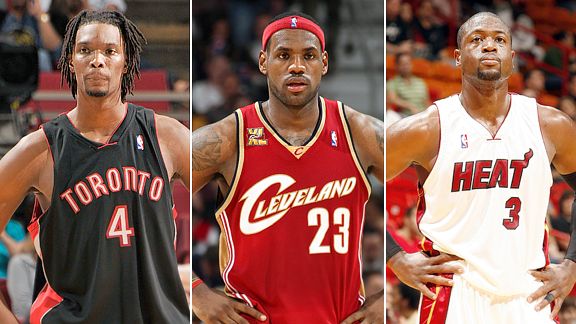
One of my favorite sports writers, Dan Shaughnessy, recently penned a piece for Sports illustrated where he tells about some of the old time ball players and how much they cultivated a sense of hatred for their rivals. They would avoid engaging one another socially in order to keep one thing clear: these men are not my friends, they are my rivals and my job is to destroy them on the court, the field, or the diamond. Shaughnessy’s point, of course, is that this attitude has largely disappeared from professional and even college sports. Almost all pro players are members of the millionaire’s club, so they have much more in common with one another than they do with any of the common schlubs (myself included) who attend their games and buy their jerseys. With this new attitude dominating the professional leagues, it should come as no wonder that LeBron James, Dwyane Wade and Chris Bosh (rivals a few months ago) would collude to form a partnership in Miami for the sake of “winning.” Why the scare quotes? Because I’m not sure what “winning” means any more, and judging by the attitude of many of our most successful churches, I think many Christians are having similar difficulties.
When LeBron announced to the world that he was going to “take my talents to South Beach and play for the Miami Heat,” he was also telling the world that “winning” was the most important thing to him. Many in the sports media celebrated this single-minded determination to “win a ring,” as if everyone who ever won a silver or bronze medal was some kind of loser. “Winning” had become synonymous with “winning a championship” and anything less was looked upon as somehow pathetic. If LeBron et al find a way to win a championship in Miami, I’ll always look on it as a “Thin Win,” a victory stripped of all of its character and nuance. I’ll look on it as I always looked on the gym class victories of that huge kid who’d failed second grade several times. I’ll look at any future Miami championship exactly as I look at my victories in Go Fish when playing my four year old. Even if they manage to climb to the pinnacle of the NBA I’ll always look at them the way my wife and I looked at the motorists who spent half an hour driving up Mount Greylock in Western Massachusetts or Whiteface Mountain in the Adirondacks as we took off our backpacks and untied our hiking boots. “OK, so you’re at the top, but what did it take for you to get here? Show me your bruises and blisters? Who do you think appreciated the view more?
One Sunday a few weeks ago I agreed to take one of my wife’s graduate students on a tour of local Evangelical churches. She is studying Christianity in Africa and was continually coming up against the vocabulary that so many Evangelicals use as a kind of short hand. So I took her to some congregations where she could see “contemporary worship,” “speaking in tongues,” “intercessory prayer,” and “full immersion baptism.” As someone who had grown up in Europe, she was unfamiliar with most of these ideas. However, what struck me most on our tour was a peculiar contrast. Allow me to describe to you the two congregations we visited while leaving out their names. Anyone familiar with Montreal Evangelical communities will no doubt recognize the congregations I’m referring to.
Congregation A consisted of probably 400 people. It met in a dated church building (What were architects thinking in the 1970s!?!) with traditional pews. It had a praise and worship band that was competent and it played tunes that I recognized from my childhood. In a nod to the summer months the pastor preached without a tie, but many of the men wore coats and the ladies dresses. Probably 50% of the congregation consisted of families with children, but grandparents and even great grand parents were well represented.
Congregation B consisted of probably 900 people. It met in a refurbished Roman Catholic church building with a towering dome and spacious halls. The entire space had been opened up and had a warehouse kind of feel, but the praise band filled the space with music as the complex video setup and stage lighting accented the worship time. An array of coffees and pastries were available to all and the entire building practically pulsed with youth and vitality. I saw lots of tattoos but almost no white or even grey hair.
I have no desire to rekindle Evangelical debates about decorum in church services or worship styles. These superficial differences aren’t really what concern me. My question to you is, “Which congregation is winning?” Now obviously there isn’t really a competition going on here and church life isn’t about “winning” in any traditional sense of the term, but let’s be honest with ourselves for a moment. Pretend that you’re a newly minted minister with an MDIV. What kind of congregation would you like to lead? When you look out over the landscape of potential job opportunities, where would you rather land? If instead of an MDIV you have an MBA would you rather work for Google or for a midsized paper company in Scranton, PA? And if you’re not a minister or seminarian, imagine that you’ve recently moved to Montreal (Bienvenue!). Which church looks more exciting, feels more successful? Where are you drawn?
I may be stretching a bit here, but I see a connection between Lebron’s decision and the ways in which many of us (myself most definitely included) judge congregations and understand success. “Winning Now” is gratifying. Being a part of a growing, hip, cutting edge congregation is gratifying. It must feel great to move to a new town and slide right into a thriving church, just as it must be extremely attractive to a young minister looking for a job. But what about the climb, the journey, the thrill of knowing that you are part of building something? There is also tremendous work to be done for the Kingdom of God in small congregations, un-hip congregations, even shrinking congregations! I’m sure every minister longs for the days when she or he might climb into a pulpit and preach the Gospel to throngs of movers and shakers, just as every rookie athlete loves the idea of holding the championship trophy aloft during a celebratory parade. But let’s not forget that great players also play for losing teams. Athletes can strive valiantly and still come up short.
The good news for churches is that “winning” in a traditional sense is not what it’s all about. So let’s think again about how we define what “winning” or success might look like for Liberal Evangelicals.



